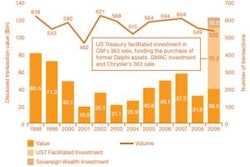
More than 700 large corporate and government clients of U.S. Bank attended the conference, held at Disney's Coronado Springs Resort.
While 75 percent of business-to-business payments in North America are still made by check, government agencies led by the Department of Defense and the General Services Administration (GSA) are working with their bank partners to move beyond checks toward seamless electronic payments, industry leaders said.
Initially motivated to cut costs in an era of tight budgets, government entities are finding additional benefits such as more efficient record-keeping and easier public accessibility to public domain data.
"New processes developed over the past 10 to 12 years are saving significant taxpayer money," said David Shea, program director of the GSA Office of Charge Card Management. "Purchasing cards today generate $1.8 billion dollars in annual cost savings for the federal government, plus $255 million in refunds [from incentives offered by financial institutions for using the cards]."
Speaking on a panel addressing "the New Payments Reality," Shea said he foresees more innovation stemming from President Obama's 2009 directive to wring $40 billion more out of government procurement processes in the next two years. "That can't happen just by negotiating better pricing or sourcing more strategically," he said. "It'll have to come from using better processes. I see that happening across the landscape."
Innovation needn't mean major new technology investments, Shea said. Often it comes from government agencies working with their bankers on new uses for existing technology. He cited the Veteran's Administration's Prime Vendor program, which procures $4 billion dollars in supplies for VA hospitals in a process that is not only paperless, but card-less as well.
In the private sector, meantime, the paper check continues to defy long-held predictions of its demise. Marcie Verdin, senior vice president for commercial products at MasterCard Worldwide, who also participated in the panel, said that many organizations still have a comfort level with the physical "paper trail" that check receipts provide.
"Electronic payments have made headway in corporate environments by making the payments process more efficient than checks," Verdin said. "But if we ever expect checks to go away, we as an industry need to keep driving added value in the form of greater convenience, information and efficiency for those who choose to pay electronically."












